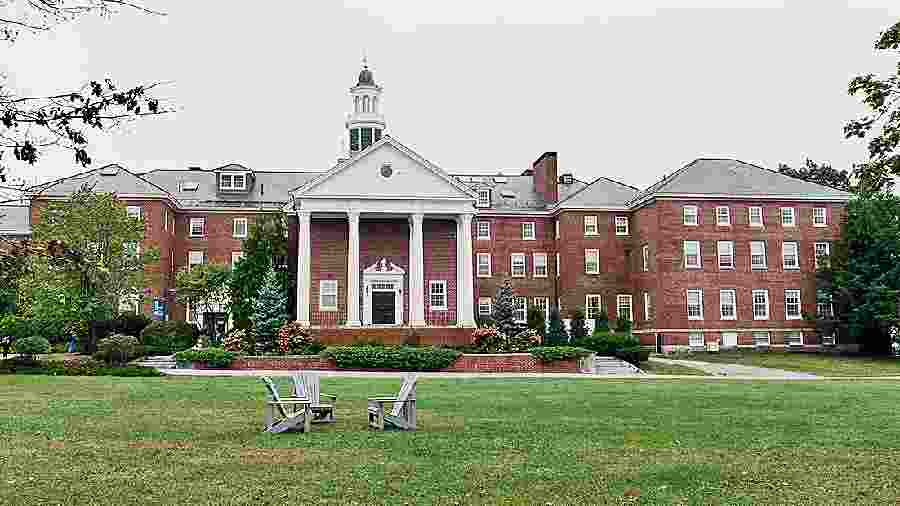Over the last two years, applications at the Colby-Sawyer Colle ge in New London in the state of New Hampshire in the US fell about 10 per cent, hurt by the pandemic and by competition from less expensive public colleges in the area.
Against that backdrop, Colby-Sawyer made what looks like a radical decision. It hacked the official price of tuition for the 2023-24 school year to US $17,500, from about US $46,000, a drop of 62 per cent. Its published tuition is now only slightly higher than the cost of attending regional public universities.
Colby-Sawyer has joined a growing number of small, private colleges in what’s called the tuition reset, which overhauls prices to reflect what most students actually pay after discounting through need-based and merit financial aid.
The reset is part marketing move and part reality check. It is a frank recognition among some lesser-known colleges that their prices are something of a feint. They are high in part to mimic the price tag of the most elite colleges and universities — suggesting that this is an education worth paying for — but in reality, the prices are not based in fact. At Colby-Sawyer, every student gets a discount.
“I don’t want to call it a game, because it’s not a game,” said Susan D. Stuebner, the president of Colby-Sawyer. “But this phenomenon in higher education of a high sticker price, high discount is so confusing to students’ families.”
Many potential applicants, she said, balked at the sticker price and did not investigate further.
Many private colleges are feeling the pressure to fill their classes. They are competing for a dwindling number of college-age students and face a growing skepticism about whether the degree — and debt — is worth it.
Nearly one-third of parents and students believe that a college education is overpriced compared with its value, according to a recent Sallie Mae and Ipsos study. [Sallie Mae is a private education lender while Ipsos is the world’s third-largest insights and analytics company.] The same study found that 81 per cent of families had crossed a school off their list at some point because of its high cost.
The resistance to tuition increases is a reversal from 20 years ago, when some colleges found that raising prices goosed applications, known as the Chivas Regal effect, as families equated price with quality. Families also liked the prestige of receiving scholarships. Colleges got into the habit of raising prices every year and then using financial or merit aid to discount the price for students who could not afford full fare or for high achievers and athletes whom they wanted.
In the last two years, several private schools have announced a tuition reset. Last year, Houghton University in Houghton, New York, declared itself the best-priced Christian college in the nation with its tuition cut. Fairleigh Dickinson, which has two campuses in New Jersey, announced a tuition cut of about 25 per cent, effective last year. Its president, Christopher A. Capuano, explained in an opinion essay in The Star-Ledger of Newark that the university was reacting in part to a decline in enrolment during the pandemic and to concerns over student loan debt. But marketing also played a role.
Public universities are also getting into the act. Many state university systems have frozen tuition, including in New York, Virginia, Nebraska, Wisconsin, South Carolina and Tennessee.
Analysts say tuition resets are unlikely to extend to the smaller subset of more competitive schools, ones with robust endowments and bigger applicant pools. Colleges like Amherst and Swarthmore can cover the cost of attendance for low-income students, and they rely on wealthy families willing to pay full freight to help fill the gap.
“What you see is a gigantic dichotomy between the very elite schools” — both public and private — “and the other schools, which are accepting almost every student that applied and hoping they can get enough of them to say yes,” said Lucie Lapovsky, a consultant on tuition resets who worked with Colby-Sawyer. Selective schools that aspire to be at the very top will likely not reset tuition.
At Colby-Sawyer, the hardest sell was probably to current students, said Destiny Cruz, a senior and the president of the school’s student government association, who had to explain the change to her fellow students. They were disappointed when they realised that they would not gain from the tuition reset; their net price would remain the same.
The reset, so far, has not been a panacea. The college’s announcement, which generated buzz on social media and in news coverage, led to an immediate surge in applications when it was announced after Labor Day — an increase of 75 per cent over the same time last year, according to college officials.
Since then, visits and inquiries continue to be “way up”, but the number of applications has returned to normal levels, said Parish, the head of college advancement. He anticipates that the true impact on applications will not be felt until the next admissions cycle.











